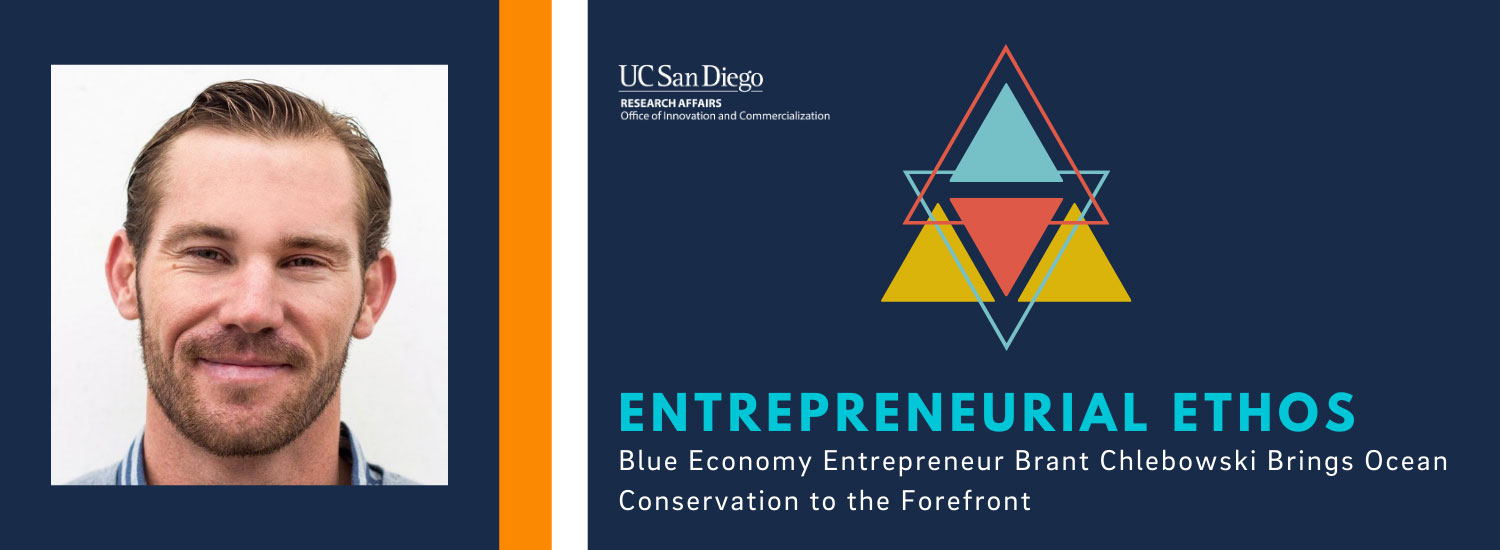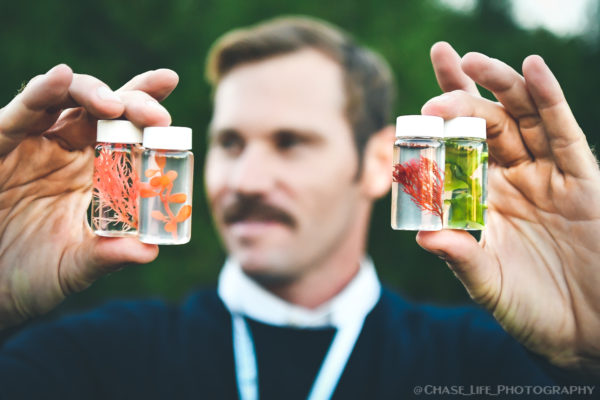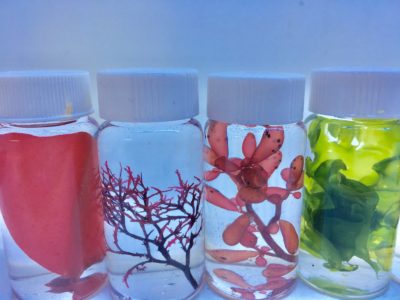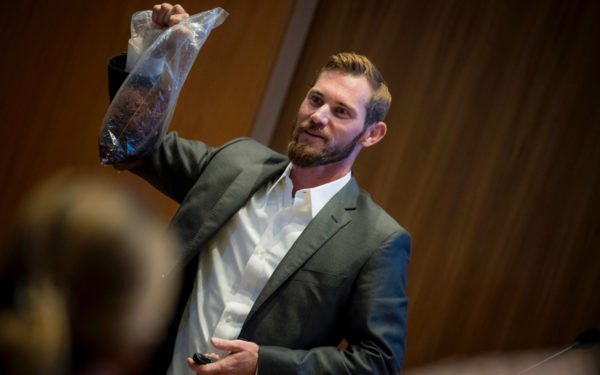
Blue Economy Entrepreneur Brant Chlebowski Brings Ocean Conservation to the Forefront
April 20, 2021
Expanding aquaculture of sustainable seafood, founder and President of California Seaweed, Chlebowski has traveled the UC San Diego innovation journey - from Triton undergraduate to staff at Scripps Institution of Oceanography, all with a passion for native California seaweeds.
Obtaining degrees from Scripps Institution of Oceanography's MAS MBC Program, UC San Diego, and a MicroMBA from the Rady School of Management, he is an expert in ocean conservation communication. Getting science to the streets, Chlebowski co-founded Salty Cinema, a science communication event series celebrating key ocean conservation issues, open to the public to engage with experts directly.
With topics ranging from sustainable seafood, the polar ocean, deep seas, plastic pollution and the role of outdoor recreation to conservation, guests have included Jessica Meir, NASA astronaut and Scripps alum, Ian Urbina, New York Times investigative journalist, and Bren Smith of Greenwave, all changemakers in their respective fields.
Modifying campus to engage the public and educate, his work has also helped beautify campus, co-founding the McReynolds Family coral garden with Nina Rosen (alum MAS 2017), allowing others to study the effects of waves and currents in the formation of a coral reef.
Read more on his journey navigating the wave’s of our own entrepreneurial ecosystem as this year’s Entrepreneur in Residence.
 You launched California Seaweed while still studying and working at Scripps Institution of Oceanography. How do you believe Scripps, with UC San Diego, is riding the wave of the region's growing blue economy?
You launched California Seaweed while still studying and working at Scripps Institution of Oceanography. How do you believe Scripps, with UC San Diego, is riding the wave of the region's growing blue economy?
From my experience in the startup process, UC San Diego is well positioned for success. It’s about commitment, direction, and the momentum to continue the work. San Diego has a long maritime history, with a working waterfront at the heart of the city. UC San Diego is cranking out a huge volume of skilled researchers and Scripps Institution of Oceanography is poised to be a global leader in blue economy innovation but it requires strategic prioritization from top campus leadership and sustained budget support. After all, budgets demonstrate where an organization places value.

Blue economy is not just about ocean conservation - it crosses disciplines of health, urban safety, national security, and even international relations. It opens up the opportunity to support our near border in northern Baja via other universities and connect UC San Diego’s impact further, including regional blue economy innovation partners such as Port of San Diego, TMA BlueTech and startBlue, a new ocean-focused accelerator with Rady School of Management.
You are also an Aquaculture Technician working on the commercialization of macroalgae. Share your vision for UC San Diego's role at the crossroads of the ocean and biological sciences?
I’ve been fortunate to work with experienced aquaculture systems engineers and in the process I’ve learned some of the hidden history of Scripps Institution of Oceanography’s role in advancing applied aquaculture research, work that goes back decades. There’s a great foundation to build on and a new focus on solution oriented research which is just in time since the global challenges facing the oceans have never been greater in our lifetimes. The pandemic has highlighted the value of community health both in medicine and food.
For California that big blue opportunity is right offshore in the ocean - both for discovering new health cures from the sea and building a more diversified, resilient local food system with shorter supply chains that sustainably utilize resources close to population centers. In my research, we are using an applied focus on sustainability - there’s a huge opportunity for a center of excellence for applied aquaculture research. With a strategic approach to organizing resources around creating real world solutions, UC San Diego can conduct research that supports blue economy innovations like greenhouse gas mitigation, discovering new therapeutic drugs, and growing food and feed from the sea sustainably!
 What excites you the most about the potential of interdisciplinary research and the opportunity for a new wave of startups focused on human health?
What excites you the most about the potential of interdisciplinary research and the opportunity for a new wave of startups focused on human health?
Food is medicine. Human health encompasses the range of human experience - body, mind, and spirit. A lot has been brought into focus for the globe this last year, as we reflect on our own human health. Feeding people something that is growing naturally in the ocean and delicious, with 10x more health benefits was a no brainer to pursue. Seaweed is a natural product superfactory!

There is the Scripps Center for Marine Biotechnology and Biomedicine, which has sequenced a fraction of what's in the global ocean and is interested in bringing new robotic automated tools and state of the art technology to unlock unprecedented natural product discovery and marine microbiome science. There are so many exciting developments on this front. The ocean finds a way to solve human caused or focused problems, including disease, discovering new molecules to help heal us. This is the true measure of preventive health and wellness.
The Triton Innovation Challenge is coming up, bringing to the spotlight commercially promising, environmentally focused technologies on campus. How do you feel these competitions help or present tough decisions for startups in the pipeline at UC San Diego?
As a graduate student, I took my company through the challenge and was able to formally incorporate from the winnings! Now in my role as mentor, I am eager to prepare people for this incredible challenge. I have been paired with several blue economy startups focused on topics from wastewater treatment (SynBioEnergy), developing renewable packaging from seaweed, and improving marine mammal detection to keep animals safe and the economy moving through our crowded coastal waterways.
Support means you have a shared network of people rooting for you. To get up and present your ideas in front of an audience, it presents tough decisions. You only have so much time, money and energy to spend. Who is willing to do this on your team? It's a great test case for the private sector space. It can and will challenge people to reach higher. Your judges may become your next board member or write you a check. It’s a fantastic opportunity for UC San Diego to further connect to San Diego’s innovation ecosystem.
 Describe one of the most valuable lessons gained from a mentor in your journey and how has it continued to guide you today?
Describe one of the most valuable lessons gained from a mentor in your journey and how has it continued to guide you today?
I had to go seek out the people who work in it, including Scripps pioneers like Dominick Mendola who has built countless startups. There is no substitute for getting your idea out into the world. You have to build something for people to respond to. It's never perfect, there are guaranteed to be failures, yet this is more instructive and formative to the journey.

Embrace failure, try your best and be brave. The rest will follow.
What interested you in sharing your passion as an Entrepreneur in Residence at UC San Diego?
It was a chance to give back. During the pandemic shutdown, I was eager to find the next project. I think what I bring is a perspective of journey - from undergrad and volunteer to private sector employee and now staff. Not one was exceptional in itself but the total of experience was amazing. Those experiences have expanded my perspective on what success looks like and what’s important to work on for me - protecting the natural environment and this country.
In one of my current mentor roles in the Innovation for National Security program, students are focused on the nation’s emerging threats and security challenges while working with innovators inside the Department of Defense. The course teaches students entrepreneurship while they engage in what amounts to national public service. Your efforts are multiplied by all the community on campus. Give a boost. Shine a light. I want to recruit more UC San Diego alumni to the program. Come be an EIR...come change the world again at UC San Diego.
To learn more about California Seaweed’s impact, please visit http://californiaseaweedco.com.
To contact Chlebowski, please email bchlebow@ucsd.edu